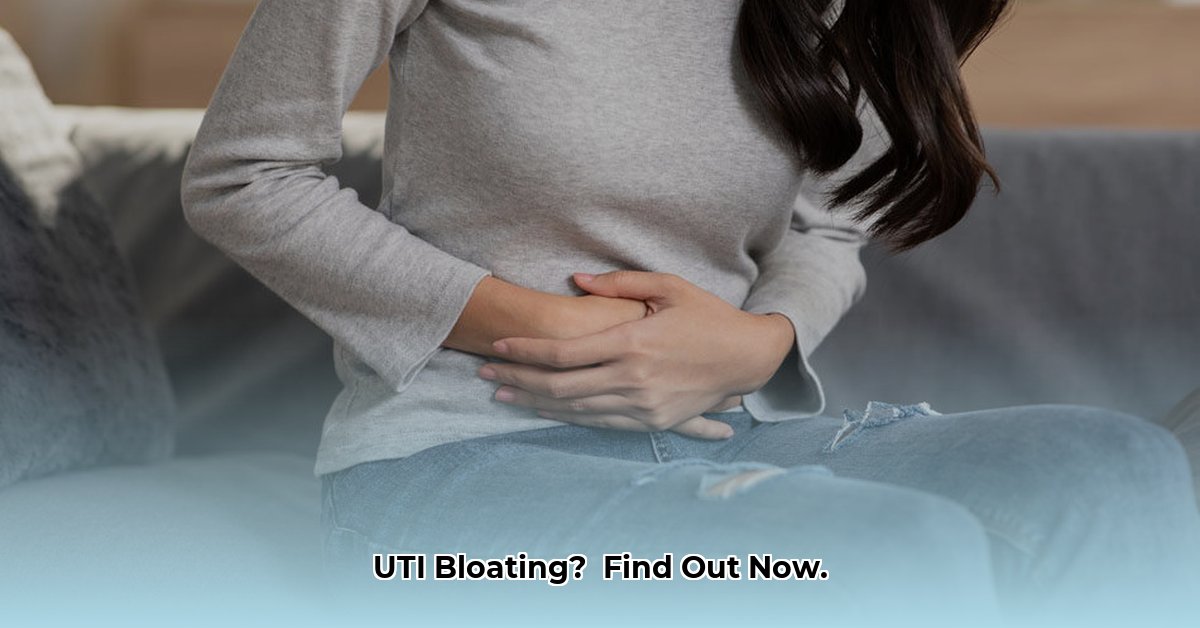Bloating can be uncomfortable and concerning, and you might wonder if it’s a sign of a urinary tract infection (UTI). While a UTI can sometimes cause bloating, it’s not the most common symptom. This guide will explore the connection between UTIs and bloating, discuss other potential causes of bloating, and explain what steps you should take if you suspect a UTI.
Understanding UTI-Related Bloating
A UTI develops when bacteria enter the urinary tract, leading to infection and inflammation. This inflammation, primarily in the bladder and urethra, can sometimes cause swelling and pressure in the lower abdomen, which some individuals may perceive as bloating. Additionally, the discomfort and pressure from needing to urinate frequently, a common UTI symptom, can also contribute to this feeling of fullness.
Recognizing UTI Symptoms
Bloating alone is not a definitive indicator of a UTI. Other, more common symptoms often accompany a UTI, including:
- Frequent Urination: A persistent urge to urinate, even if little urine is passed.
- Urgent Urination: A sudden, overwhelming need to urinate that is difficult to control.
- Painful Urination (Dysuria): A burning or stinging sensation while urinating.
- Cloudy or Bloody Urine: Urine that appears hazy, milky, pink, red, or brown.
- Strong-Smelling Urine: Urine with a foul or unusual odor.
- Pelvic Pain (Women): Discomfort or pressure in the lower abdomen or pelvic region.
- Lower Back Pain: Aching or discomfort in the lower back.
Specific populations may experience different UTI symptoms:
- Children: May exhibit only generalized symptoms like fever, irritability, or poor feeding.
- Elderly: May experience confusion, delirium, or new-onset incontinence.
- Catheter Users: May have fever, chills, cloudy urine, or drainage around the catheter site.
Other Bloating Culprits
Bloating is a common symptom with various potential causes, including:
- Irritable Bowel Syndrome (IBS): A chronic digestive disorder causing abdominal pain, bloating, gas, and changes in bowel habits.
- Constipation: Difficulty passing stools, leading to abdominal fullness and discomfort.
- Cystitis (Interstitial Cystitis/Bladder Pain Syndrome): Chronic bladder inflammation without infection, causing similar symptoms to a UTI.
- Dietary Factors: Certain foods, such as beans, lentils, and carbonated drinks, can cause gas and bloating.
- Hormonal Changes: Fluctuations in hormone levels, particularly during menstruation, can lead to bloating.
Suspect a UTI? Next Steps
If you suspect a UTI, see a doctor for a diagnosis and treatment. A simple urine test can confirm the presence of an infection. If a UTI is diagnosed, antibiotics are usually prescribed.
Temporary Bloating Relief (Does NOT Treat the Infection):
- Hydration: Drink plenty of water to help flush out your system.
- Warm Compress: Applying a warm heating pad or compress to your lower abdomen may provide some comfort.
These home remedies are for comfort only and do not address the underlying infection. It’s crucial to complete the full course of antibiotics prescribed by your doctor, even if your symptoms improve before you finish the medication.
Preventing UTIs
While not all UTIs are preventable, these strategies can reduce your risk:
- Hydration: Drink plenty of water throughout the day.
- Hygiene: Wipe from front to back after using the toilet.
- Urination After Intercourse: Empty your bladder soon after sexual activity.
- Avoid Holding Urine: Don’t delay using the bathroom when you feel the urge.
While some research suggests cranberry products may have some preventative properties, larger, more rigorous studies are needed to confirm their effectiveness. Relying solely on cranberry juice or supplements for UTI prevention is not recommended.
When to Seek Immediate Care
Seek immediate medical attention if you experience any of the following:
- High Fever (100.4°F or higher):
- Back Pain (especially flank pain):
- Chills:
- Nausea or Vomiting:
- Mental Confusion or Disorientation:
These symptoms may indicate a kidney infection (pyelonephritis), a serious complication that requires prompt treatment.
Conclusion
Bloating can be a symptom of a UTI, though less common than other signs. If you experience bloating along with other UTI symptoms, it’s essential to consult a doctor for diagnosis and treatment. Early diagnosis and appropriate antibiotic treatment are crucial for preventing potential complications. Remember, this information is for educational purposes only and should not replace professional medical advice. Always consult with a qualified healthcare professional for any health concerns or before making any decisions related to your health or treatment.
- Good Mindfulness Books For A Calmer, Happier Everyday Life - February 4, 2026
- Recommended Meditation Books for Beginners and Experienced Practitioners - February 3, 2026
- Great Mindfulness Books to Guide Your Journey to Inner Peace - February 2, 2026
















